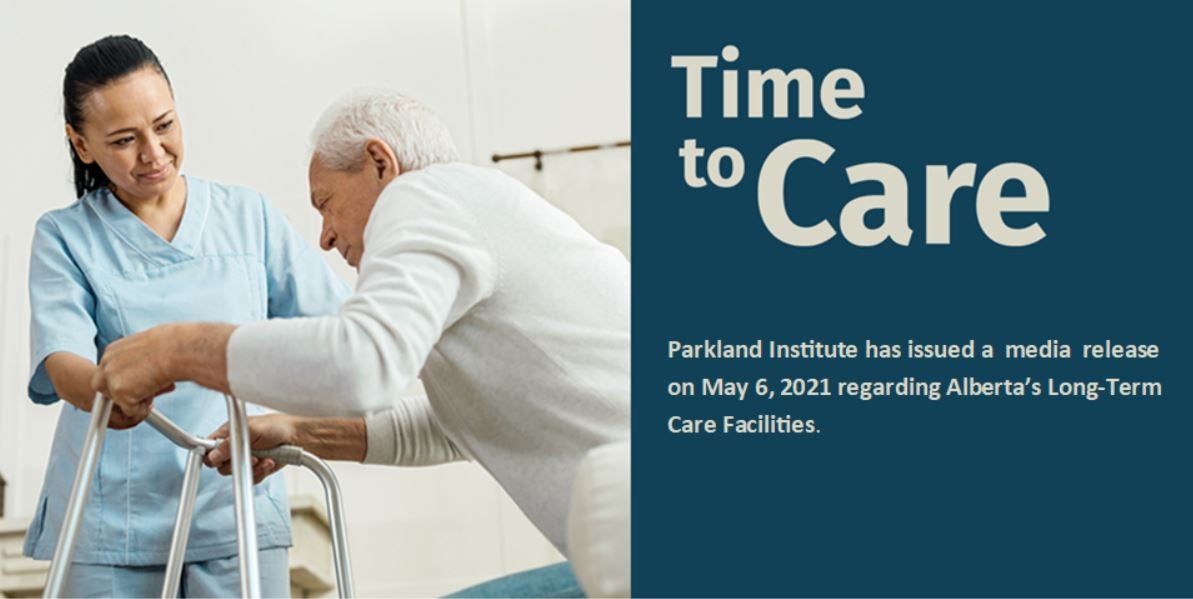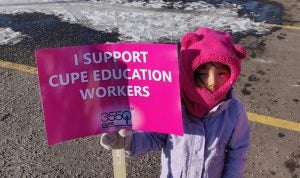
Media Release
May, 6, 2021
Seniors Care Staff Study Calls for More Time to Care
Report reveals more than 40 per cent of seniors care centres
can’t meet adequate care needs
Edmonton – A new Parkland Institute study, Time to Care: Staffing and Workloads in Alberta’s Long-term Care Facilities, by Parkland research manager Rebecca Graff-McRae, reveals that many seniors continuing care centres are chronically understaffed and unable to meet the basic care needs of seniors.
Parkland Institute researchers collaborated with the Canadian Union of Public Employees (CUPE-AB) to survey more than 350 LTC staff across Alberta in early 2020 and found nearly half of respondents – 43 per cent – didn’t have adequate time to complete required tasks consistently. Only 24 per cent stated they never had essential tasks outstanding at the end of a shift.
“Our study reveals why the coronavirus pandemic became a matter of life and death, as many seniors care facilities that had previously “managed” with inadequate staffing levels were unable to provide even the most basic levels of care for their residents – with tragic consequences,” says report author Rebecca Graff-McRae. “The Alberta government needs to listen to the health providers on the frontlines about the serious implications of lack of care staff if we are going to fix the crisis in seniors care.”
Staff are left with few options: leave important aspects of their job – including care tasks – undone, work through their breaks, or stay late to finish. Seventy per cent of respondents stayed beyond the end of their shift at least occasionally and nearly one quarter – 24 per cent – stayed late either daily or once per week. It is clear from these responses that staying beyond the end of their shift is the norm for many LTC workers.
“Exhausted, rushed and stressed staff cannot provide the level of personal, relational care that residents need and deserve”, said Kelly Spence, CUPE Local 8 site vice-president. “Concerns about adequate staffing to meet the care needs of residents have been raised for decades, but the Government of Alberta has not undertaken any study of staffing levels and working conditions in the LTC sector.”
“For far too long the government has allowed residents and workers to fall through the cracks,” said CUPE Alberta president Rory Gill. “The impact of COVID-19 has made these problems more acute and frankly, more deadly. It’s time the government stepped up and ensured adequate staffing and resources for long-term-care facilities. The workers and residents deserve it.”
When asked whether their facility had adequate staffing to provide quality care for residents, a significant disparity could be seen across ownership/profit categories: 34 per cent of respondents based in for-profit facilities reported they never have adequate staff-to-resident ratios to meet resident needs, compared to just seven per cent for public facilities. Not-for profit facilities fell in the middle at 16 per cent.
“When homes are understaffed, that hurts workers and residents,” said June St. Lewis, an AUPE steward at a continuing care home. “Workers want to be able to provide the highest possible quality of care, but we just don’t have the resources to do so. We end up burnt out, and residents end up with care that doesn’t meet the standards we aim for.”
“When staff in for-profit long-term-care facilities report they are almost five times more likely to never have adequate staff-to-resident ratios to meet care needs, then we know residents in for-profit facilities are more at risk of adverse outcomes,” says Graff-McRae. “With two-thirds of all COVID-19 deaths happening in long-term-care centres in Canada, the fact that for-profit facilities provide fewer hours of direct care per resident per day and are more likely to have fewer staff per resident should be of central concern to the government’s review of seniors care. Unfortunately, the government is moving to protect seniors care corporations against legal liability with Bill 70, rather than address the underlying reasons for the crisis in seniors care.”
“Profit has no place in continuing care,” said Mike Dempsey, vice-president of AUPE. “These facilities should have one purpose — to provide good care for Alberta’s seniors, and create good jobs in the process. Profit-making directly contradicts that goal. The only way to make sure this doesn’t happen again is to bring the entire continuing care system under public control. From there, democratically elected governments can choose to do things like increase staffing levels and implement the standards of care that seniors deserve.”
“Workers are tired of being called heroes while governments ignore our cries to improve standards in continuing care in Alberta,” said St. Lewis. “We want more than words, we want action.”
-30-
For more information or to arrange interviews, contact:
Sarah Pratt, communications co-ordinator
spratt1@ualberta.ca
587.338.0171
Parkland Institute is a non-partisan public policy research institute in the Faculty of Arts at the University of Alberta. “Time to Care” is available for download on Parkland Institute’s website.



